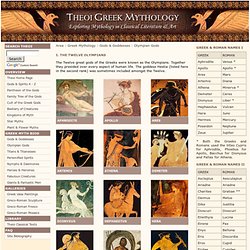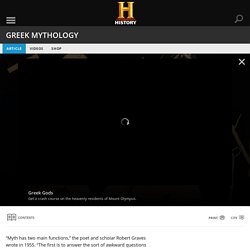

12 Greek Gods and Goddesses Known as the Olympians - Table of Contents. Greek Mythology Gods Olympians. The Olympians are a group of 12 gods who ruled after the overthrow of the Titans. All the Olympians are related in some way. They are named after their dwelling place Mount Olympus. Zeus Zeus overthrew his Father Cronus. He then drew lots with his brothers Poseidon and Hades. Poseidon Poseidon is the brother of Zeus. At one point he desired Demeter. His weapon is a trident, which can shake the earth, and shatter any object. Hades Hades is the brother of Zeus. He is also the god of wealth, due to the precious metals mined from the earth. Hestia Hestia is Zeus sister.
Hera Hera is Zeus wife and sister. Hera's marriage was founded in strife with Zeus and continued in strife. Once when Zeus was being particularly overbearing to the other gods, Hera convinced them to join in a revolt. Most stories concerning Hera have to do with her jealous revenge for Zeus's infidelities. Ares Ares is the son of Zeus and Hera. Athena Athena is the daughter of Zeus. Apollo Apollo is the son of Zeus and Leto. Hermes. Mythology - Ancient Greek Gods and Myths. Greek mythology. Greek Gods and Goddess Symbols. The Greek pantheon is by far, the most studied religious pantheon in the world. Every Greek god and goddess bears a set of his/her unique symbols, by which he/she can be identified.
Read through this Buzzle article to know about the symbols of the Greek divinities. The Greek mythology is rich with many myths and legends. According to the Greek mythology, there were fourteen Olympian deities who ruled the world from their heavenly abode on Mount Olympus. The king of these divine beings was Zeus, the most powerful of them all. The Greek Olympians and their Symbols The ancient Greek deities, and their symbols stood for the kind of powers they had, and the things they ruled over. Olympian Gods of Greek Mythology THEOI.COM. The Olympian gods ("Theoi Olympioi") presided over ever facet of ancient life and were often grouped according to their common functions.

THE THEOI AGORAIOI were the gods of the "agora" (the marketplace and people's assembly). Zeus, as the god of kings and princes, presided over the the assembly, alongside Athena, as goddess of wise counsel, Dike (Justice), Themis (Custom) and Calliope (Eloquence). The gods of the marketplace, on the other hand, were led by Hermes, the god of commerce, along with Hephaestus and Athena, the patron gods of artisans : weavers, potters, metalworkers, sculptors, etc.
Apollo was another god of the marketplace. Greek Mythology — History.com Articles, Video, Pictures and Facts. In Greek mythology, there is no single original text like the Christian Bible or the Hindu Vedas that introduces all of the myths’ characters and stories.

Instead, the earliest Greek myths were part of an oral tradition that began in the Bronze Age, and their plots and themes unfolded gradually in the written literature of the archaic and classical periods. The poet Homer’s 8th-century BC epics the Iliad and the Odyssey, for example, tell the story of the (mythical) Trojan War as a divine conflict as well as a human one. They do not, however, bother to introduce the gods and goddesses who are their main characters, since readers and listeners would already have been familiar with them.
Around 700 BC, the poet Hesiod’s Theogony offered the first written cosmogony, or origin story, of Greek mythology. Later Greek writers and artists used and elaborated upon these sources in their own work. Greek Mythology. Greek Mythology.